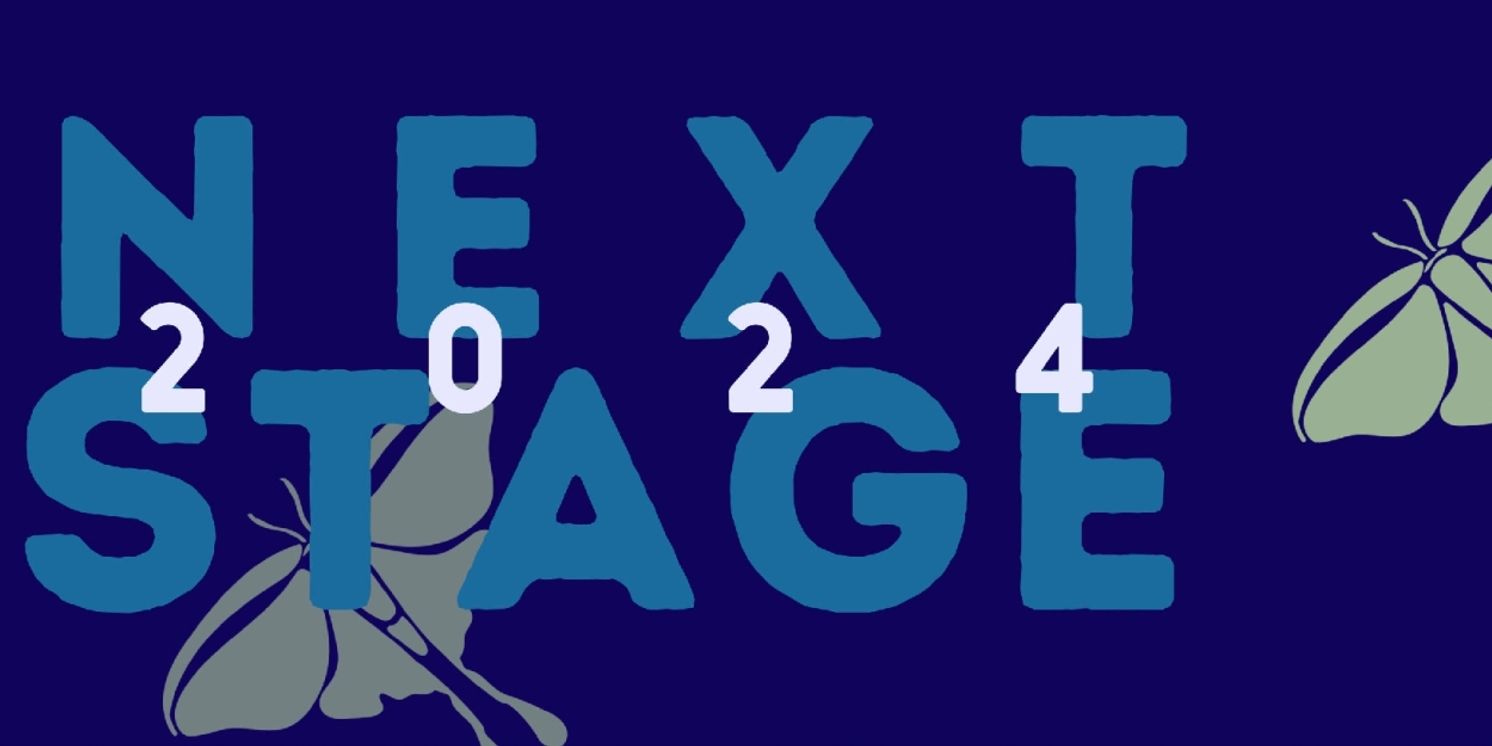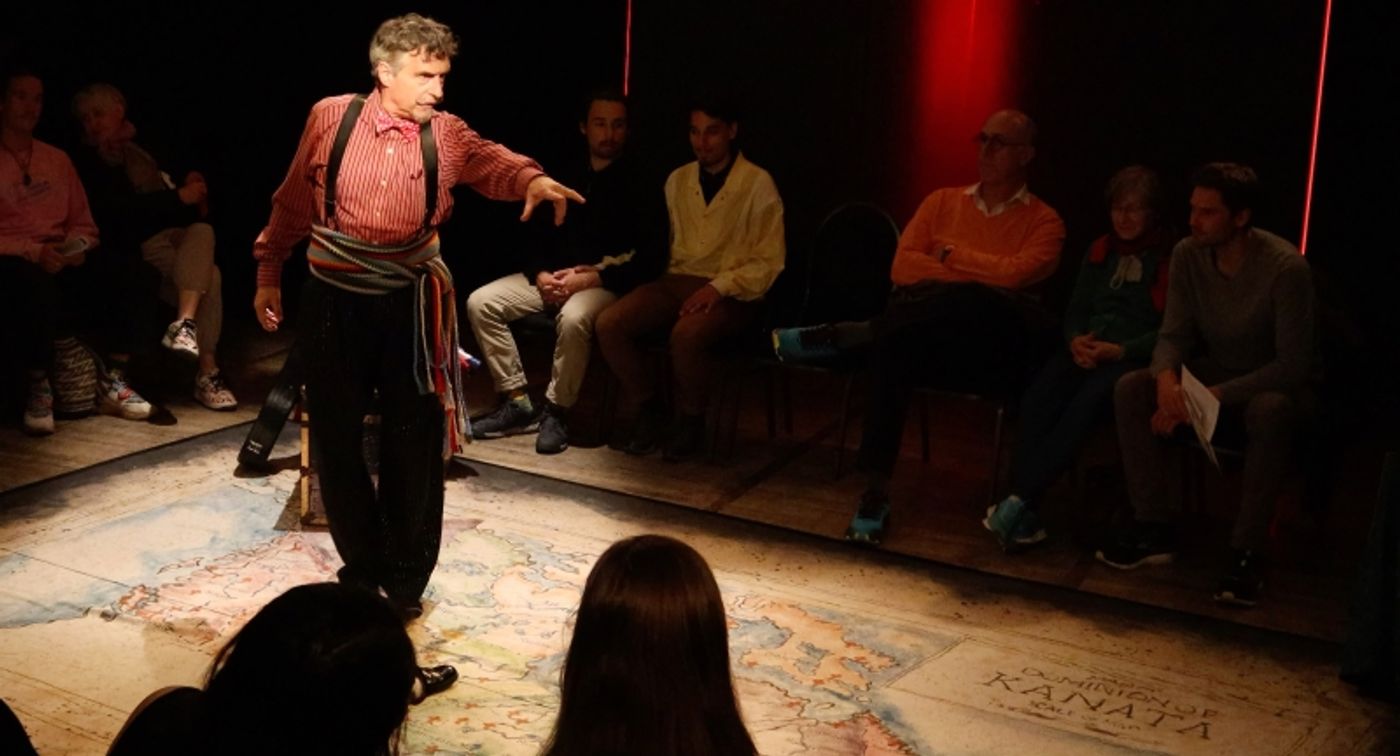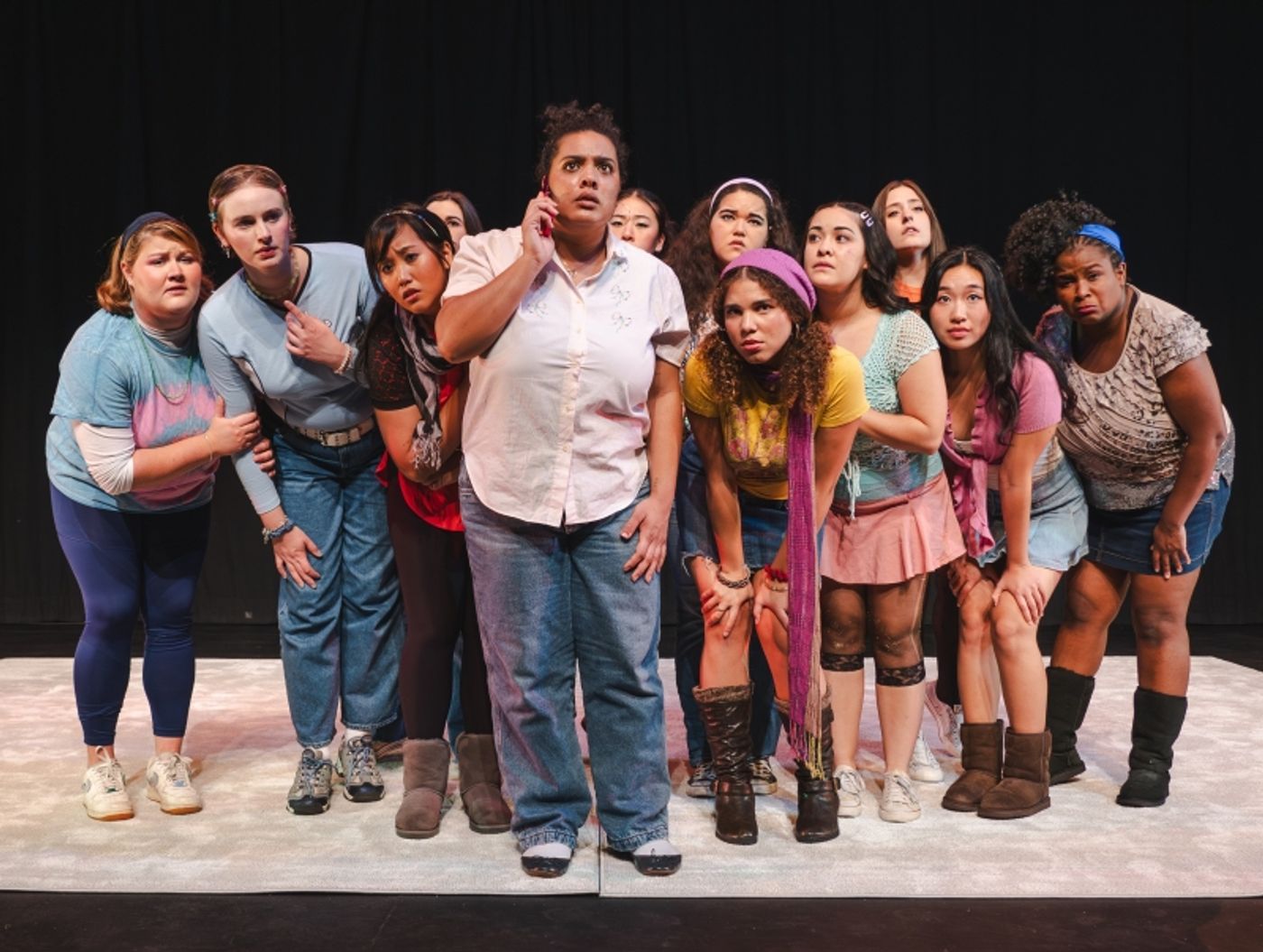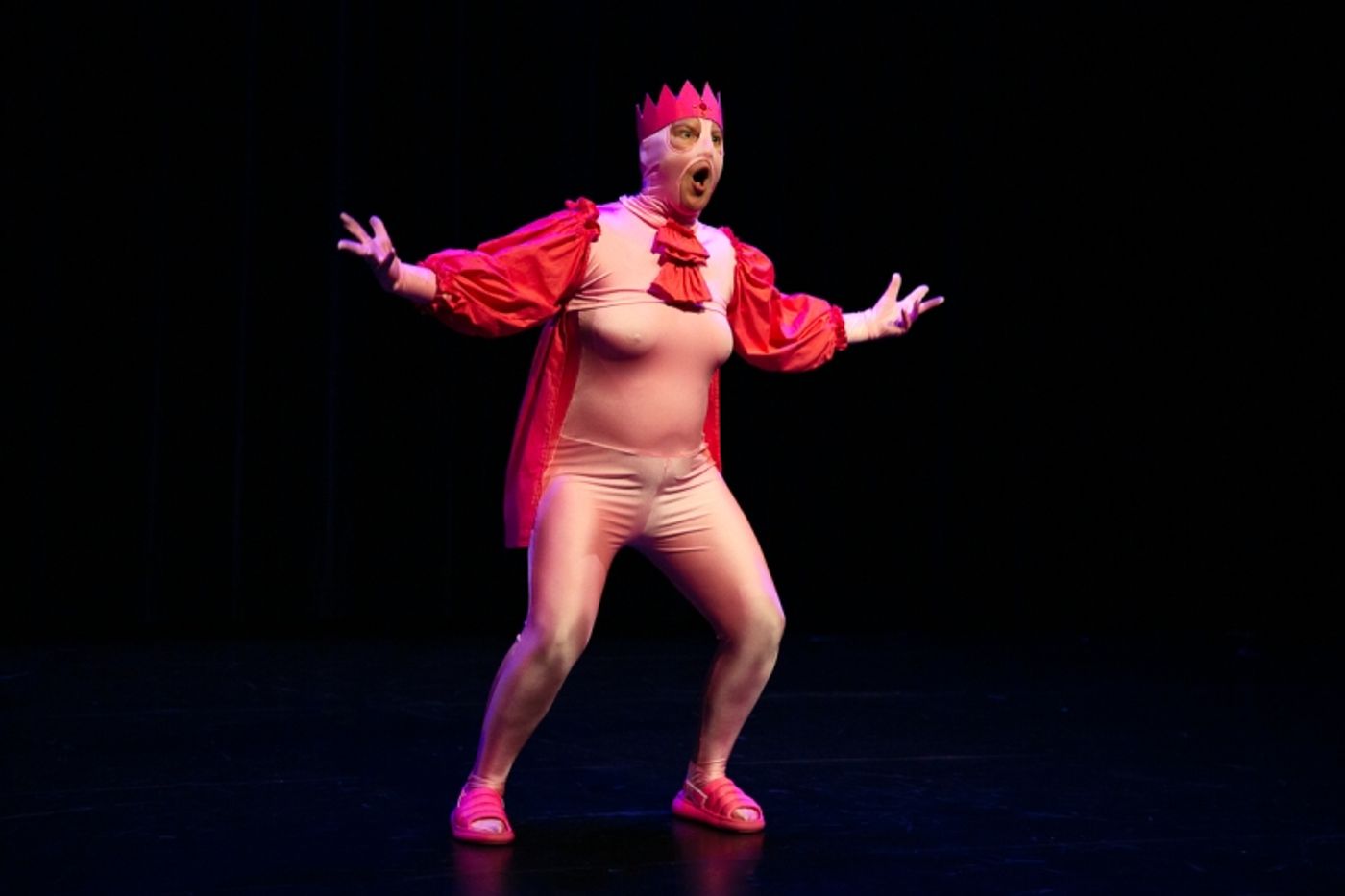Review: NEXT STAGE FESTIVAL: PART 2 at Buddies In Bad Times
Reviews of Civilized, I Was Unbecoming Then, and Prude

The Next Stage Festival, curated and run by Toronto Fringe, plays at Buddies in Bad Times Theatre until Sunday, October 27. Read our reviews of the first three shows in the festival here. The last three, below:
CIVILIZED

“I did this for you!” wails William Blank (John D. Huston), a mid-level official in Wilfred Laurier’s Indian Affairs department. As he defends the work of his department in “civilizing” the Indigenous people of Canada, Blank’s face is the opposite of his name; gasping and choking, hand covering his mouth and eyes wide, he begs us to understand and appreciate his actions. He’s come back from the grave to plead his case—but, of course, the grave he left was single and marked with his name, far from the anonymous mass graves of children behind the residential schools his government created.
In CIVILIZED, as Blank details his government’s goals, you may find yourself reflecting on the difference between the adjective and the verb form of the title; one a genteel, learned and kind descriptor, the other a forced submission, a breaking and cultivation of souls. Playwright Keir Cutler’s intimate and moving hour-long show, set up inside a circle of onstage audience seating, is similarly a dual experience, half hard-hitting history lesson and half cri de coeur for those who never got to speak.
Before transforming into Blank, complete with plastic Canadian flag glasses and natty suspenders and bow tie (evocative set and costumes by Jay Havens), Métis actor Huston (who says his Protestant ancestors called themselves “half-breeds” rather than Métis before being told that was no longer acceptable) prefaces the show by highlighting his own background and story of being adopted by a white family in the 1960s. This puts the following character monologue in context, softening the screed into satire with a clear point of view.
Huston’s story of his adoption comes with a meaningful and upsetting metaphor. His potential adoptive parents were warned, he says, that his appearance might not stay consistent as he aged; if they accepted him as a baby, they would need to be prepared for “the colour he might one day grow into.” The implication is straightforwardly visual, referring to the darkening of skin, but also intimates that, one day, an Indigenous child might prove too hard to control, if he seeks connection with his heritage and culture.
Civilizing Indigenous children out of this culture is what Blank is all about. Pulling out pictures of his idols in government, each not-so-subtly coloured in clown motif, he crows that the department of Indigenous Affairs was full of idealistic poets. All they wanted to do, he insists, was bring language and knowledge and opportunity to the next generation. Huston’s so earnest that you almost believe him…until, of course, he starts idly wiping his feet on the map of Canada that covers the stage, seemingly unconcerned with the impact his footprints make on what’s underneath—the marked locations of those mass graves.
At the same time, he slavers over a portrait of Pauline Johnson, a contemporary entertainer of mixed Mohawk and European descent, whose gimmick was presenting white audiences with the buckskinned exoticism they wanted to see before transforming into a picture of white civility. It’s the dream for Blank, and a poignant callback to how Huston as Métis actor tells his story for us before transforming himself into the “civilized” white man who devolves before our eyes.
A 2011 poll of 117 historians voted Wilfred Laurier Canada’s best prime minister. In the intervening years, Laurier’s destruction of Indigenous communities has been more widely publicized, calling the embrace of his government into question. Blank derisively refers to our era as “a time where everything exists to be torn down,” but later tells the story of a righteous doctor who tried to sound the alarm about conditions in residential schools even in Laurier’s time, only to be suppressed by the government to which he reported. In the past, there were heroes, villains, and villains who thought they were heroes. With this knowledge revealed, it’s up to the viewer to decide what deserves to stay in the grave, and what should be brought to light.
Photo of John D. Huston by Keir Cutler
I WAS UNBECOMING THEN

Fans of the gorgeous soundscape created in February’s Universal Child Care will enjoy I WAS UNBECOMING THEN, an a cappella-backed piece set in a largely pre-social media and pre-Glee 2006 Vancouver high school music room, where twelve teenaged girls navigate the weeks before their trip to a critical competition in Banff while “mixing hormones and harmonies.” Both are in great supply; as the girls deliver short observations to the audience from the freewheeling and amorphous book by Lyndsey Bourne, they’re unabashedly horny and often crude, refreshingly unafraid to be the weird young women they are within the walls of their sanctum musicorum.
The pressures of the world are ever-encroaching, however; there’s a long-running prank feud with the unseen boys of the group, of whose lesser talent the girls speak scathingly, and there’s a constant pressure to be “music director’s pet” to the also unseen Bruce, whose presence looms over the production. Bruce lets the girls call him by his first name, spurs rivalries for his attention with his exacting standards, and is on speed dial on at least one bright pink Motorola RAZR. The potential issues involved in these blurring of boundaries are thrown into sharp relief when another scandal rocks the school.
The large cast lounges on a set by Echo Zhou 周芷會, consisting only of two neutral carpets; one gets rolled up and removed after that shocking revelation, representing the reduction of the students’ world with the threat to their sense of safety and stability. They now must take up only half the original space, which might bring them closer together, or tear them apart. Despite the underlying story, this isn’t a simple school soap opera; the plot, such as it is, rests firmly in the background, supporting short, sometimes random-seeming interactions between the young women as they navigate existence. Despite the fact that, with so many different characters, there’s not much time to get to deeply know any student, most are immediately identifiable character types, and it’s fun to watch them find their way socially and as individuals.
Highlights include Annika Hanson’s watchful Lucille, popular girl Daisy played by Heeyun Park 박희윤 of Natasha, Pierre, and the Great Comet of 1812, and out-of-pocket Rebecca, whom Astrid Atherly imbues with an almost otherworldly indifference while making bizarre pronouncements. Director Ilana Khanin corrals the large cast so that they rarely miss a beat, crucial in a show more about individual moments and timing than storyline.
Clearly created by at least one former choir kid, the book also features plenty of jokes and Easter eggs for those of us who’ve spent years running scales and performing Eric Whitacre’s latest hit.
Then, there’s the music, as promised. Sam Kaseta’s delicate a cappella pieces flow in and out, moving with the piece instead of stopping it, clearly as integral to the teens’ lives as breathing. Bourne’s words create intriguing imagery; one character describes her heart as “beating like a runny nose.” The skilled performers are a joy to listen to, swirling through complex harmonies as the characters always sync up via this one action, despite any distance they may have from each other.
“Keep giving birth to yourself,” urges one young woman as she details a visceral series of dreams in which she emerges from her own body. I WAS UNBECOMING THEN is a bit of an odd duck of a piece, just like its characters, but it offers an assured portrait of a stage of life that’s both awkward and beautiful with the promise of rebirth, the girls discovering who they are again and again.
Photo of Grace Rockett, Anikka Hanson, Lizzie Song, Olivia Daniels, Riel Reddick-Stevens, Jenn Tan, Shannon Murtagh, Tkaia Green, Lara Hamburg, Miranda Wiseman, Heeyun Park, and Astrid Atherly by Taylor Long
PRUDE

Who wants to be the King of the Party? Learn how to shoot to the top of everyone’s guest list with this motivational talk from Lou Campbell, who bursts in dressed in pale pink full-body spandex body stocking, adorned with a magenta crown and royal cape denoting their status as revelry royalty (striking costume by Everette Fournier). PRUDE’s seminar-cum-party (seminarty?) with hidden depths, which premiered in Toronto at the 2022 Fringe, is just as delightful now as it was then, full of energy, humour, and compassion.
Campbell’s advice for how to be a party animal par excellence involves sublimating everything to the needs of the party, including your own identity. It’s a three-step process: “One. Look hot. Two. Get fucked up. Three. Find someone to hook up with as soon as possible.” If poet Mary Oliver’s famous description of the condition of self-acceptance is, “You do not have to be good. You only have to let the soft animal of your body love what it loves,” the hard partying animal is the complete opposite: you have to fit in, regardless of your true nature. You have to destroy your body to the expectations of others, and by doing so you have to love what society loves: drinking and sex, especially sex.
Telling stories of their deliberate, painful climb to the top of the social list, Campbell relates stories including a high school basement bong hit, a grad trip with unlimited alcohol and sex contest, and a one-upping fetish party where participants try to claim the most outré fixation. Telling the stories in the cabaret of Buddies, home to its own bar and many wild nights, makes them hit harder. We’re asked: Is there a way to be sex-positive, without indicating that sex is the be-all and end-all of human identity? What if Item Three on the King of the Party list gets a lukewarm reaction from you, at best?
If this sounds like the seminar is becoming a lecture, it’s not. Campbell keeps things uproariously funny throughout, even when things get deep, awkward, or painful. One would expect the King of the Party to be loud—and there are definitely pulse-pounding sound effects—but Campbell plays with volume in their delivery in an almost magical way, whispering to make you lean forward before bursting out with a boisterous, raw punchline. Their physicality is also captivating, as they dance with complete conviction, writhing and flailing to match whatever club hit sound designer Peter Sarty has chosen. An interlude where they introduce a box of turn-ons is tear-inducingly funny.
PRUDE explores embracing asexuality in an environment where cultural cachet is often determined based on tales of wild adventures, and progressiveness is sometimes linked to a willingness to do anything with anyone, regardless of whether it pleases the soft animal inside. It speaks to a new progressiveness, that of radical self-acceptance in choosing to be the king of one’s own party, dancing to the beat of one’s own drum.
Photo of Lou Campbell by Daniel Wittnebel
Reader Reviews
Videos

